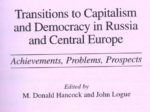In this paper, I am publishing for the first time the author’s devil’s advocacy document when I was Senior Advisor to the Chief Economist of the World Bank, Joseph Stiglitz.
Transitional Heresies of a Devil’s Advocate
Keiretsu, Proportional Representation, and Input-Output Theory

This is Chapter 9 in my book: Ellerman, David. 1995. Intellectual Trespassing as a Way of Life: Essays in Philosophy, Economics, and Mathematics. Lanham MD: Rowman & Littlefield.
This essay grew out of an attempt to model mathematically the possible cross-ownership arrangements that might arise between privatizing firms in the former Yugoslavia [see Ellerman 1991]. The cross-ownership arrangements resemble the groups of Japanese companies called keiretsu. There is cross ownership between the companies in the group as well as some ownership outside the group that is traded on the stock market. In spite of the partial outside ownership, the keiretsu often behave as “self-owning” groups. If firm A owns shares in B, then the management in A usually signs over its proxy on shares in B to the management in firm B. And the management in B does likewise with respect to the managers in A. Thus within certain constraints, each firm can act like a “self-owning” firm, not totally unlike the self-managing firms of the former Yugoslavia.
Worker Ownership and the Current Crisis

There are so many crises these days (coronavirus, global warming) that this paper seems already out of date since we are referring to the crisis caused by the neoliberal post-socialist transition policies in East Europe and elsewhere in the post-socialist world.
Knowledge and Institutional Change

This paper attempts set forth systematically some of the knowledge questions that determine certain strategies for institutional change.
Voucher Privatization with Investment Funds

This paper has been cited many times as the representative critique of voucher privatization with investment funds.
Neoclassical Economics as the New Social Engineering

This is a paper on the role of neoclassical economics in the disastrous “Big Bang” or “shock therapy” advice given by Western academics and Western advisory agencies to the post-socialist countries. It is part of the Oxford Handbook of Professional Economic Ethics.
1991 clippings on work in Slovenia

Here are a few newspaper and magazine clippings from my efforts in Slovenia in 1990-91 to get a worker-ownership privatization law drafted and passed.
Helping People Help Themselves

The full title to this book is: Helping People Help Themselves: From
the World Bank to an Alternative Philosophy of Development Assistance. The book is an intellectual analysis, giving a full history of the relevant ideas, of the various modes of “helping” in general and development assistance in particular.
Why Shock Therapy was Wrong

This article in Challenge May-June 2003 tried to pull together thoughts on two questions: the overall institutional change strategy and the alternatives to and arguments against voucher privatization.
Wall Street Capitalism as “The Model” for Market Economies

This paper addresses the way the American “Wall Street Capitalism” embodies the irresponsible disconnect between action and the results that markets (unlike governments) are supposed to prevent. This paper is in the Slovene journal Theory and Practice that dates back to 1964.